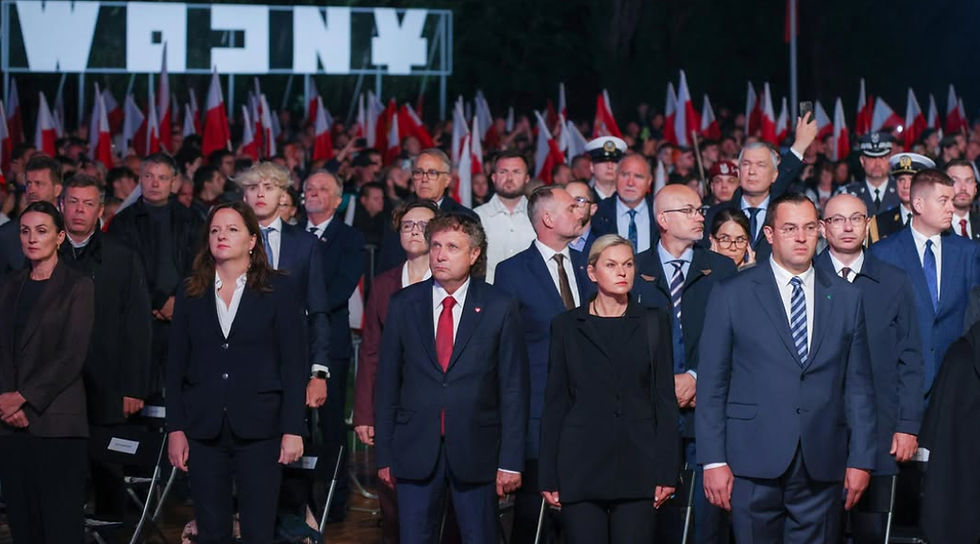The Voivode of the Lower Silesian Voivodeship emphasized that she will support Belarusians who have been forced to leave Belarus in matters of legalization
- Admin of the NAM

- Sep 5, 2025
- 4 min read

The Deputy Head of the United Transitional Cabinet and member of the Coordination Council, Pavel Latushka, held a meeting in the city of Wrocław with the Voivode of the Lower Silesian Voivodeship, Anna Żabska.
During the meeting, the main topic of discussion was advocacy regarding the appeals of Belarusian citizens residing in the Lower Silesian Voivodeship, concerning the resolution of problematic issues. First of all, the appeals concerned:
acceleration of the procedure for reviewing and issuing a travel document;
legalization of children born on the territory of Poland;
questions regarding queues for submitting and reviewing applications of Belarusian citizens for legalization in the voivodeship;
opening bank accounts for Belarusian citizens in the voivodeship;
other issues related to the legalization of Belarusians.
Pavel Latushka, as the head of the Belarusian part of the Working Group at the Ministry of Interior of Poland on the legalization of Belarusians in Poland, discussed with the Voivode possible issues that require resolution at the central government level of Poland, as well as problematic issues that can be resolved at the level of the voivodeship administration.
The Voivode noted that local authorities have faced a significant influx of refugees, primarily from Ukraine and Belarus, which has considerably increased the time required for processing the relevant documents.
The representative of the Cabinet particularly emphasized that Belarusians, unlike citizens of other countries, do not have the protection of their state, which does not provide them with legal documents: it does not issue new passports nor extend their validity, and it has limited the use of powers of attorney issued in Poland for obtaining documents in Belarus. This places Belarusian refugees in a particularly vulnerable position.
Pavel Latushka noted that he will advocate for the resolution of problematic issues within the framework of the Working Group on legalization and during the upcoming first session of the inter-ministerial group on Belarusians in Poland, scheduled for October 13 of this year.
The problematic issues were prepared jointly with the Wrocław Belarusian Community and formed during Pavel Latushka’s meeting with the Belarusian diaspora living in the region. The Chair of the Council of the Wrocław Belarusian Community also participated in the meeting.
Separately, during the meeting with the Voivode, Pavel Latushka initiated discussion on the possible assistance to Belarusian political prisoners who are forced to leave Belarus or are being deported from their country.
Pavel Latushka also informed about extraterritorial persecution of Belarusians living in Poland: hundreds of criminal cases initiated, aimed at persecuting Belarusians abroad, attempts at blackmail, recruitment, and persecution of relatives and close ones in Belarus.
It is worth noting that in May 2024, Pavel Latushka had already met with the Voivode of the Lower Silesian Voivodeship, and during the current meeting, a certain improvement in the situation regarding the issuance of documents for the legalization of Belarusians in the voivodeship was noted, while problematic issues requiring further resolution remain.
During his stay in Wrocław, Pavel Latushka also held meetings with Jerzy Pankowski, Orthodox Archbishop of Wrocław and Szczecin, and with the head of the College of Eastern Europe, Laurynas Vaiciunas.
Meeting with the Voivode: Results for Belarusians in Wrocław:

On Thursday, September 4, Pavel Latushka held a meeting with Belarusians to discuss the main problems and issues concerning our community. People openly shared their stories about difficulties with documents, queues, work, and life in Poland, and also asked questions about the activities of democratic forces.
On September 5, a second meeting was held — this time with the Voivode Hanna Zabka. The Community received an invitation from Mr. Pavel to participate in order to convey the voice of the diaspora.
We came prepared: we submitted to the Voivode two documents — Summary of the Main Problems of Belarusians and a Checklist of Necessary Changes — as well as the results of a survey we conducted at the beginning of the year regarding the community’s needs with real examples and figures.
During the meeting, the Chair of the Council, Syarzhuk Dubina, noted that the issuance of the Polish travel document (DP) takes 4–6 months instead of one month, even though the court mandated it to be done within a month. We described chaotic queues, which force people to stand overnight and place themselves on “informal lists.” We raised the issue of children born in Poland without documents and emphasized the need to have a ready plan in case political prisoners are released en masse.
Meeting results:
The Voivode agreed that it is necessary, on behalf of the DUW, to send letters to banks, institutions, and workplaces so that they recognize the travel document as a valid document.
The Voivode acknowledged that the problem of children without documents exists and promised to make efforts to address this issue.
The Voivode noted that in the event of mass release of political prisoners, this will be coordinated at the highest level, and her administration will be ready to assist — with housing, medical, and psychological support.
Remaining issues:
Obtaining prepared travel documents without reservation.
Proposal to introduce specific days when it is possible to submit a full set of documents and immediately start printing.
The Voivode noted that any informal lists of people in line are illegal, but no alternative solution has yet been found.
However, we will continue to work on these proposals, supporting them with specific stories and examples, and call on interested parties to cooperate!
On behalf of the Wrocław Belarusian Community, we are grateful to Pavel Latushka for the initiative and invitation to this meeting, as well as to the Voivode and her team for their openness to dialogue.










Comments